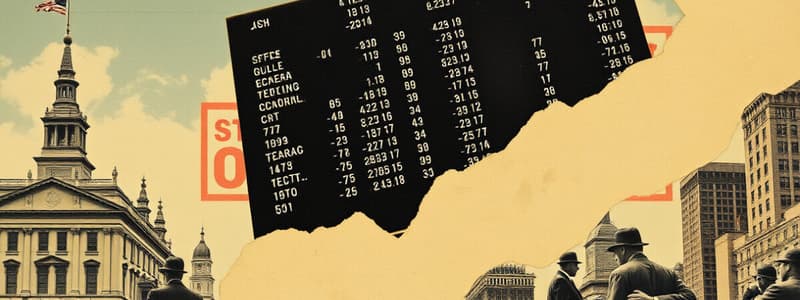Podcast
Questions and Answers
What were the causes of the Great Depression?
What were the causes of the Great Depression?
- Stock Market Crash
- Bank Failures
- High Tariffs
- All of the Above (correct)
What is a stock market?
What is a stock market?
A system for buying and selling stocks in corporations.
What does a bull market indicate?
What does a bull market indicate?
A long period of rising stock prices.
What is margin in investing?
What is margin in investing?
What does a margin call mean?
What does a margin call mean?
What is speculation in the stock market?
What is speculation in the stock market?
What is a bank run?
What is a bank run?
What does installment mean in finance?
What does installment mean in finance?
What does collapse refer to in economic terms?
What does collapse refer to in economic terms?
What does it mean to invest?
What does it mean to invest?
What is a sum?
What is a sum?
Who was Alfred E. Smith?
Who was Alfred E. Smith?
What is Black Tuesday?
What is Black Tuesday?
What is the Hawley-Smoot Tariff?
What is the Hawley-Smoot Tariff?
What does a bailiff do?
What does a bailiff do?
What is a hobo?
What is a hobo?
What is a soap opera?
What is a soap opera?
What does suspend mean in a banking context?
What does suspend mean in a banking context?
What is a colleague?
What is a colleague?
What is a technique?
What is a technique?
What was the Dust Bowl?
What was the Dust Bowl?
Flashcards are hidden until you start studying
Study Notes
The Causes of the Great Depression
- The Great Depression was marked by significant economic downturns impacting many sectors.
- Stock Market: A system facilitating the buying and selling of company stocks; necessitated careful monitoring for profits.
- Bull Market: Characterized by a prolonged increase in stock prices, benefitting investors and brokers financially.
- Margin: Allows investors to purchase stocks by only paying part of the price upfront, which could amplify profits but increased risks.
- Margin Call: Brokers requiring repayment for loans used to buy stocks on margin if stock prices fall, pressuring investors to sell.
- Speculation: High-risk stock purchases with hopes of rapid price increases, contributing to market instability.
- Bank Run: Occurs when customers withdraw their deposits en masse due to fears of bank insolvency, often leading to actual bank failures.
Economic Practices and Impact
- Installment: Purchasing goods on credit with scheduled payments, enabling consumers to buy immediately while spreading cost over time.
- Collapse: Refers to the sudden devaluation or failure of assets; particularly relevant during the stock market crash leading to widespread financial loss.
- Invest: The act of allocating money into businesses in anticipation of future returns, demonstrated by investments in thriving companies like Disney.
- Sum: Refers to total amounts, highlighting financially significant figures, e.g., total wages in 1929.
Key Historical Figures and Events
- Alfred E. Smith: A Democratic presidential candidate in 1928, representing an era of perceived economic prosperity.
- Black Tuesday: October 29, 1929, when the stock market experienced a catastrophic crash, resulting in massive financial losses.
- Hawley-Smoot Tariff: A protective tariff that raised import rates to unprecedented levels, ultimately hindering international trade despite initial intentions.
Life During The Depression
- Bailiff: A court officer associated with evictions and property dispossessions, often feared by economically struggling families.
- Hobo: A term for itinerant workers seeking employment and a better life, often traveling via freight trains during tough times.
- Soap Opera: Dramatized serial entertainment on radio or TV, providing escapism for audiences during the difficult Depression era.
- Suspend: The temporary halting of bank operations due to insufficient funds, illustrating how dire the economic conditions were.
- Colleague: Refers to individuals in related professions; during the Depression, corruption resulted in firings within government ranks.
Environmental Impact
- Dust Bowl: A major ecological disaster of the 1930s in the Great Plains resulting from severe drought, forcing many farmers to relocate in search of work and better living conditions.
Studying That Suits You
Use AI to generate personalized quizzes and flashcards to suit your learning preferences.




